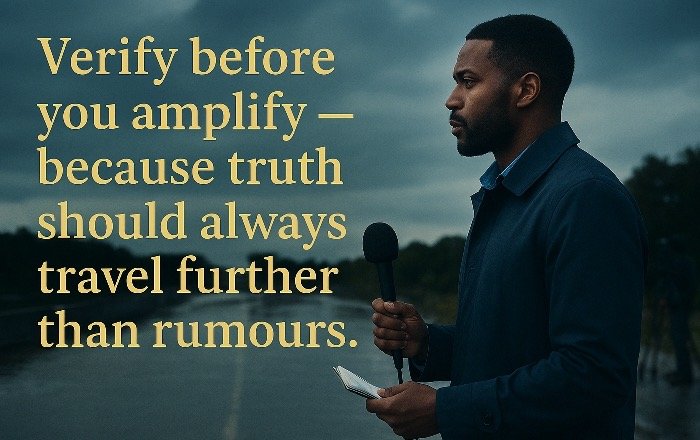In my years of working in broadcast journalism, I’ve learned that the most important responsibility of any journalist or media professional is not just to report the news — but to ensure it’s true.
Every story carries weight. Every word shapes perception. But this reality became deeply personal to me one unforgettable morning in Ibadan.
When the Breaking News Broke Too Soon
I was in the newsroom, preparing for our regular breakfast program, when a guest mentioned on air that a flood had swept people away in Ibadan.
The newsroom went silent for a moment — then erupted into action. Phones started ringing, producers barked instructions, and everyone wanted details immediately. It sounded like breaking news, and as every journalist knows, the pressure to go live first can be intense.
I quickly headed to the scene, my heart racing. I could almost feel the weight of the story — the visuals, the interviews, the possible headlines. But when I arrived, what I found told a completely different story.
The Truth Behind the Headline
The flood had not swept away people as we were told. It had only carried off a motorbike.
The rider survived — shaken but alive. Interestingly, the bike had been borrowed by an elder brother from his younger one.
That day, standing by the riverbank, I learned a powerful truth: rumour travels faster than fact, but truth lasts longer.
It was a humbling reminder of what journalism should stand for — not the race to be first, but the responsibility to be right.
Verify Before You Amplify
In news reporting, fact-checking isn’t just a formality — it’s a moral duty. As journalists, broadcasters, and even digital content creators, we must resist the urge to amplify information that hasn’t been verified.
One inaccurate story can damage trust that took years to build. But when you take the time to confirm your facts, your credibility becomes your loudest voice.
That experience in Ibadan reinforced a lesson I carry to this day:
It’s better to be right late than wrong early.
The Relevance of Verification in Today’s Digital Age
Fast forward to today’s world of digital journalism and social media, where stories go viral in minutes. The temptation to publish first is even stronger — but so is the danger of misinformation.
At Switch24, we believe that media ethics and content credibility are non-negotiable. Every journalist, content creator, and communicator must remember that our words shape public opinion and trust.
The digital world doesn’t just need faster news; it needs truer voices.
Final Thoughts
Whether you work in a newsroom, manage a brand, or create content online, the principle is the same:
Always verify before you amplify.
Your integrity is your most valuable asset.
And in a world flooded with information, truth remains the strongest current.

